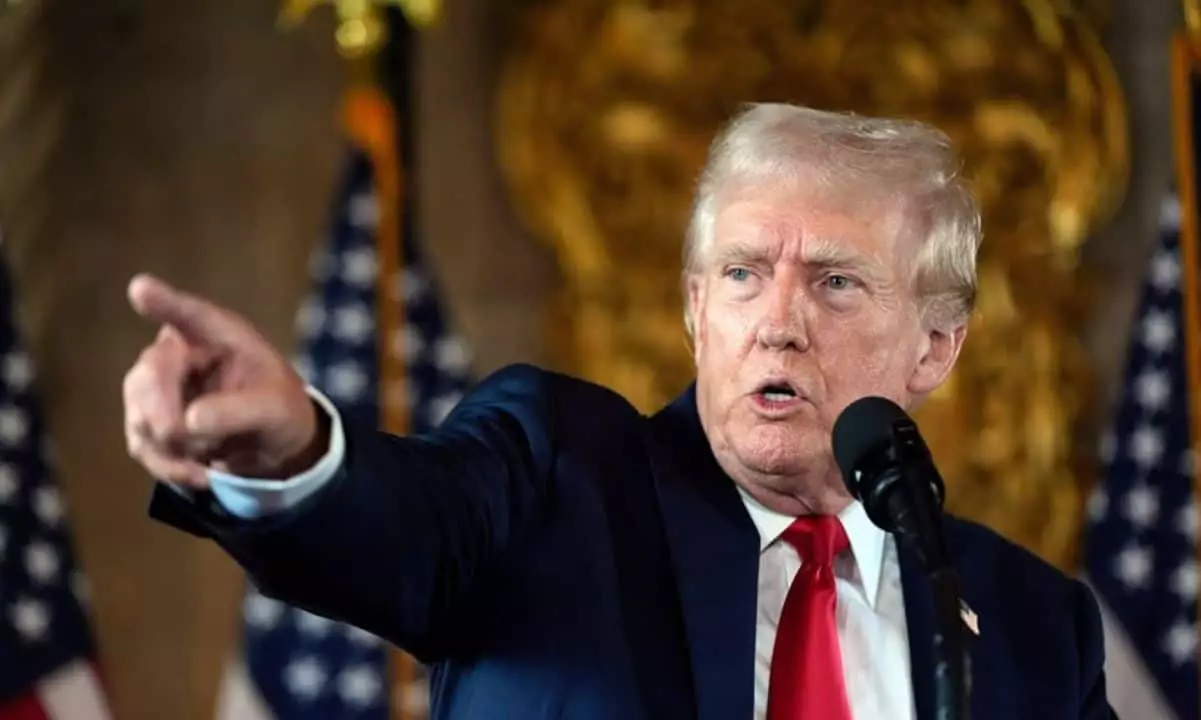The recent gala at President Donald Trump’s Virginia golf club is a vivid illustration of the increasingly blurred lines between wealth, politics, and social influence. Staged for a select audience of 220 TRUMP meme coin holders, this extravagant affair raised serious ethical questions that extend far beyond mere questions of propriety. The melding of elite Bitcoin enthusiasts with corporate titans and celebrity figures was not merely a spectacle; it was an affront to the very constitutional principles that should underlie our democracy.
An astonishing $394 million reportedly changed hands as attendees scrambled to secure their place at the president’s table—a jarring instance of wealth flaunting itself in a nation founded on the ideals of equality and opportunity for all. This event has all the hallmarks of a modern-day Roman feast, where the elite are served while the masses lean outside, posters in hand, demanding accountability. Those left outside could hardly believe what they were witnessing—a gathering of America’s most powerful in close proximity to a president allegedly blurring ethical lines for personal gain.
Ethical Overreach: A Gateway for Foreign Influence
This event has plunged us into a quagmire of ethical considerations, primarily concerning how cryptocurrency can be exploited as a conduit for foreign actors to manipulate American politics. Many attendees reportedly acquired their TRUMP tokens through offshore exchanges designed to keep American users at bay, a troubling detail that casts a shadow on the integrity of our electoral process. By bypassing domestic regulations, these foreign participants threaten to undermine the very foundation of our nation’s campaign finance laws.
A swift backlash ensued, spearheaded by 35 members of Congress who, in remarkable bipartisan fashion, requested a Department of Justice investigation into potential violations of the emoluments clause of the Constitution. This is a clarion call—democratic safeguards cannot afford to be compromised by a few individuals seeking to exploit the system for personal gain. The discord overshadows what should be an inherent function of governance: to shield the American populace from manipulative influences, both foreign and domestic.
A Mockery of Transparency and Accountability
The circus atmosphere aroused by this gathering didn’t escape the notice of serious crypto critics, including Massachusetts Senator Elizabeth Warren, who unequivocally labeled the dinner an “orgy of corruption.” It’s difficult to disagree with her unvarnished assessment; the optics alone suggest a blatant stonewalling of accountability. With a mere 25 investors responsible for over $111 million worth of meme coins, the issue is not just individual malfeasance but an ecosystem that rewards lack of transparency.
While officials like Representative Maxine Waters have proposed the “Stop TRUMP in Crypto Act,” entirely barring public officials from profiting off digital assets, the question remains: can legislation alone rebuild the damaged trust? The tech-savvy elite wields power like a sword in the context of cryptocurrency, daring lawmakers to construct frameworks that might not catch up with their ambitions.
Trump’s Role: A Duality of Public and Private
In an even murkier twist, President Trump’s involvement seemingly transcends personal interests and spills into his public office. He made a rare appearance behind the iconic presidential seal at the event, only to deliver remarks that provided no substantive new policy in terms of cryptocurrency. The quick pivot back to his helicopter after touting a national Bitcoin reserve reinforces the discomforting duality of a leader who straddles both his role as a public servant and a businessman poised to capitalize on new revenue streams.
The president’s behavior reflects the troubling normalization of transactional politics. Effectively, access to power is being sold—not legally, but moralistically. While Trump may be oblivious to the gravity of public uproar, his engagement with crypto elites suggests a disturbing trend—where the rich and powerful gather in the shadows of political legitimacy, snubbing both accountability and transparency.
As protestors outside the venue shouted “America is not for sale,” one cannot help but ponder: when did we allow the interests of the wealthy few to overshadow the democratic principles that serve as the bedrock of our society? Instead of being a cautionary tale, will this event be just another flashing neon sign pointing towards a future where everything does have a price tag?


Leave a Reply